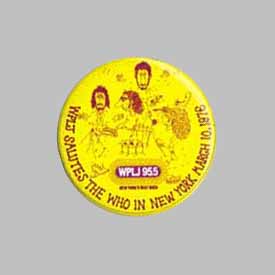What DID "WPLJ" Stand For?

There's a real Seventies trivia question for New Yorkers. Hard-core radio fans from the era will recall that the letters were the title of a song by the Four Deuces in 1955, although the more popular version was recorded (in doo-wop style) by Frank Zappa in 1970. The lyrics extolled the virtues of White Port and Lemon Juice, a drink which, according to my friend Z, was a favorite of poor, struggling musicians. Z. adds that the lemon juice was needed to make the sickeningly sweet cheap wine drinkable.
As you would expect from a station named for a Zappa tune, PLJ was, during its heyday, a pretty quirky station. Originally WABC-FM, the station at the start of the Seventies featured a "free-form" format, similar to that of its arch rival, WNEW-FM. In 1971 they changed both their call letters and style, playing a combination of album cuts from serious rock acts such as the Allman Brothers and Yes with some of the better stuff from the Top 40. The O' Jays and Carly Simon were PLJ material; the Osmonds and Cher were not. You could hear several cuts in a row without commercials, and staff never talked while a record was playing, the way they did on AM radio.
Many PLJ disk jockeys were first-rate, and you can hear some of them to this day on various stations in our area. The air staff included Jim Kerr, Carol Miller and Pat St. John, along with legendary horror film host John Zacherley, "The Cool Ghoul." Late nights San Francisco transplant Alex Bennett did a talk show, featuring guests such as Cheech and Chong and Jean Shepherd. Bennett would seem to be an unlikely choice for PLJ, in that he was openly critical of many major performers whom the station played, including David Bowie, the Grateful Dead and especially Led Zeppelin; he classified the latter as amongst "The Scum of Rock." I suspect that some of his vehemence might have been due to his having been roughed up by a bodyguard while backstage at a Zeppelin show, an incident he spoke of for quite a while. And while he considered himself a member of the "New York Art Crowd" who hung at at the famous Max's Kansas City, he was no fan of the New York Dolls. Bennett was one talk show host who did not hide his true self. Fans knew where he lived; his girlfriend appeared on the show and he brought his moods with him into the studio. Even at his grouchiest, however, Bennett was a far cry from the shock jocks and hate mongers who would later dominate talk radio.
Another PLJ regular was Bill Ayers, a Catholic priest who hosted a Sunday morning show which mixed interviews with various rock stars with a blend of spirituality and social action that was a far cry from what would develop later in the decade with the advent of the televangelists. "Father Bill" was a close friend of Harry Chapin, with whom he was heavily involved in the World Hunger Year project. I recall one show in which he consoled a caller that he would not go to Hell if he missed Mass, as those of us who attended Catechism class were sometimes told. Eventually, as was becoming very common amongst priests and nuns, Ayers announced that he was leaving the formal ministry in order to get married.
Live concerts were another great feature of PLJ. They broadcasted the farewell night at the Fillmore East, a concert by Elton John which would become an album (11-17-70) and simulcasts of WABC-TV's late night "In Concert" program. I still have a tape from that show of Rick Wakeman performing "Journey to the Center of the Earth."
In the latter part of the Seventies PLJ dropped the Top 40 material and focused entirely upon what would come to be called "Classic Rock." This was a sign of the times. "Lite" music was already becoming a format in its own right, while R and B was rapidly showing symptoms of the Disco virus. There really wasn't much for their kind of audience to hear on the pop charts. As it moved into the 1980s, however, PLJ made a 180-degree turn and itself became a 'hit' station, at which time most of us removed it from our radios' pre-set selections. Some then, the station has been fighting an uphill battle for a tiny share in the local market.

3 Comments:
I'd love to know whatever became of those old dj's. Growing up in CT in the 70's, names like Carol Miller, Pat, St. John & Tony Pigg are almost familiar as those of my old grade school friends! Wikipedia doesn't seem to know of any of them. Few have left much of a trace at all on the Internet.
Your blog keeps getting better and better! Your older articles are not as good as newer ones you have a lot more creativity and originality now keep it up!
Another element of the Zappa WPLJ story I've heard - maybe you can confirm this. Apparently WPLJ, would not play Zappa in late 60/early 70s, and that's what led Frank to pen this ode. I think they eventually started playing Zappa, but I'm curious if this is a true story.
Post a Comment
Subscribe to Post Comments [Atom]
<< Home